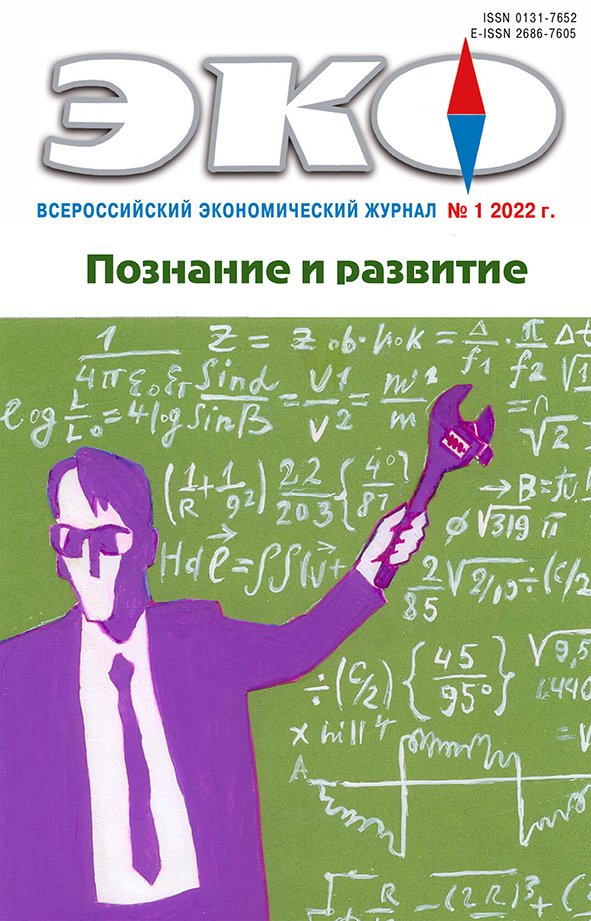Management
Published 2021-12-29
Keywords
- decision-making; performance efficiency; delegation of authority; office work; bureaucracy; management defects; apparatus of power
How to Cite
1.
Glukhov Е. Avoidance of Decision-making by Russian Officials: Forms and Consequences. ECO [Internet]. 2021 Dec. 29 [cited 2026 Jan. 20];52(1):167-92. Available from: https://ecotrends.ru/index.php/eco/article/view/4372
Abstract
The paper deals with the phenomenon of avoidance by the heads of executive bodies of state and municipal authorities of the Russian Federation to make managerial decisions. Analysis of legislation and materials of judicial practice makes it possible to identify management dysfunctions, causes and conditions that contribute to them. The bureaucratic deformations of the administrative apparatus of the authorities in matters of coordination, registration of future decisions and delaying the timing of their adoption are revealed. At the same time, it is established that the assessment of the quality of the performance of official duties by the apparatus of a public authority hardly depends on the effectiveness of the activities of this body. The interrelation of the detailed regulation of the activities of all members of the bureaucratic apparatus of power with the deterioration of its effectiveness in terms of making legitimate and effective decisions is substantiated. The author suggests optimizing the criteria for evaluating public officials, in particular, by giving managers the right to depart from the requirements of internal algorithms of activity in order to speed up decision-making, if no harm is caused to third parties.References
- Братченко С. А. Качество государственного управления: теоретический, методологический и институциональный аспекты: Научный доклад. М.: Институт экономики РАН, 2021. 55 c.
- Виташов Д. С. Бюрократия без боли: новые практики госуправления. М.: Интеллектуальная литература, 2021. 272 с.
- Глухов Е. А. Бюрократизм при рассмотрении обращений в органах прокуратуры // Мониторинг правоприменения. 2021. № 1. С. 55–60. DOI: 10.21681/2226–0692–2021–1–55–60.
- Глухов Е. А. Планы ради планов … или о содержании и объемах личного планирования // Право в Вооруженных Силах. 2015. № 7. С. 104–110.
- Глухов Е. А. Принцип Питера, или недостатки существующей системы продвижения по службе в военной организации // Право в Вооруженных Силах. 2016. № 11–12. С. 89–98.
- Корякин В. М. «Командный» принцип военно-кадровой политики нуждается в правовой регламентации // Право в Вооруженных Силах. 2008. № 8. С. 28–30.
- Кравченко А. Г. Концепция сетевого управления государством в России // Северо-Кавказский юридический вестник. 2012. № 1. С. 48–50.
- Локян А. Б. Психологические факторы эффективного коммуникативного общения государственного служащего // Государственное и муниципальное управление. Ученые записки СКАГС. 2016. № 2. С. 229–234.
- Ляндау Ю. В., Стасевич Д. И. Теория процессного управления. М.: Инфра-М., 2015.118 с.
- Максуров А. А. Координационная практика юридических служб как фактор снижения рисков и неопределенности // Советник юриста. 2010. № 2. С. 61–64.
- Маленков Ю. А. Теоретические основы трансформации современного государственного управления // Вестник Санкт-Петербургского университета. Экономика. 2013. № 2. С. 113–129.
- Матвеев В. В. Бюрократия и современная экономика // Вестник Удмуртского университета. 2005. № 3. С. 144–148.
- Носенко А. А. Инновации и стимулирование персонала к риску // Вестник университета. 2013. № 2. С. 149–153.
- Пальцев А. И. Синдром выученной беспомощности на службе у чиновника-дилетанта // Гуманитарные проблемы военного дела. 2021. № 1. С. 129–136.
- Проклов О. В. Проблемы правовой и мотивационно-ценностной деформации в профессиональной деятельности сотрудников органов внутренних дел // Административное и муниципальное право. 2009. № 5. С. 29–32.
- Сунгуров А. Ю. Роль и функции экспертов в процессе принятия властных решений // Управленческое консультирование. 2017. № 6. С. 8–15. DOI: 10.22394/1726–1139–2017–6–8–15.
- Турчинов А. И., Магомедов К. О., Кононенко Т. А. Социологический анализ проблем кадровой политики и управления персоналом в Российских организациях. Монография. М.: МАКС Пресс., 2011. 299 с.
- Федорук Н. А. Управленческое решение и его место в системе управления // Актуальные научные исследования в современном мире. 2021. № 3–8. С. 114–118.
- Drummond H. Are good leaders decisive? // Management Decision. 1991. Т. 29. № 7. Рр. 4–9. Doi: 10.1108/EUM0000000000075.
- Emsley D. Multiple goals and managers’ job-related tension and performance // Journal of managerial psychology. 2003. Т. 18. № 4. Рр. 345–356. Doi.10.1108/02683940310473091.
- Fussell P. Wartime: Understanding and Behavior in the Second World War. Oxford University Press. 1989.
- Hoffmann T. Heuristics in legal decision-making // Acta Baltica historiae et philosophiae scientiarum. Tallinn. 2020. Vol. 8. № 1. Pр. 62–71. Doi: 10.11590/abhps.2020.1.03.
- Kahneman D., Lovallo D., Sibony O. Before You Make that Big Decision // Harvard business review. June. 2011. Рр. 50–60. Doi: 10.1080/10937400390208608.
- Parkinson C. Northcote Parkinson’s Law, and Other Studies in Administration. Dead Authors Society. March 15, 2021.
- Peter L. J., Hull R. The Peter Principle: Why Things Always Go Wrong. New York. 1969.
- Tonon J. M. The costs of speaking truth to power: how professionalism facilitates credible communication // Journal of Public Administration Research & Theory. 2008. Т. 18. № 2. Рр. 275–296.

